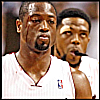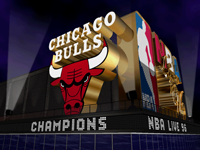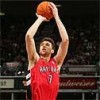Worst Starter in Each Position?
37 posts
• Page 2 of 2 • 1, 2
Re: Worst Starter in Each Position?
I love how Oskar is totally against keeping track of stats, yet he did so in his own pickup games.
-

buzzy - Take it sleazy.

- Posts: 4033
- Joined: Sun Jul 03, 2005 11:19 pm
- Location: Vienna
Re: Worst Starter in Each Position?
I don't even know who I'd put on my list, put I wouldn't put Chuck Hayes, Sefolosha and Krstic there. Hayes is a great rebounder for his size, Sefolosha is just superb defensively and Krstic sets great screens and boxes guys out, so Durant, Westbrook and Green can get the easy boards.
I don't want further argument on what I just said.
I don't want further argument on what I just said.
-

Martti. - #HeatLifer
- Posts: 8101
- Joined: Mon Oct 09, 2006 5:19 am
Re: Worst Starter in Each Position?
Oznogrd wrote:A benchwarmer is a benchwarmer for a reason. You dont get minutes for being a good guy and being able to teach. You have to show performance. What planet do you live on where you play your worst players because they're good guys? Odds are you'd play like the nets...or possibly worse.
Further to that, "good locker room presence" is well-known to be code for "Doesn't really have the talent to play at the NBA level, can hit the odd three or hustle like crazy though and he's popular with his teammates". In other words, your Brian Scalabrines and not your Kevin Garnetts.

Contact: Email | X | Bluesky
Modding Topics: NBA 2K10 | NBA Live 08 | NBA Live 07 | NBA Live 06 | NBA 2K6 | NBA Live 2005 | NBA Live 2004 | NBA Live 96
Story Topics: NBA Live 16 | NBA 2K14 | NBA 2K13 | NBA Live 06 (Part 2) | NBA Live 06 (HOF) | NBA Live 2004 (HOF)
NLSC: Podcast | The Friday Five | Monday Tip-Off | Wayback Wednesday | Facebook | X | YouTube | Instagram | Bluesky
Donations/Support: Patreon | PayPal
-

Andrew - Retro Basketball Gamer

- Posts: 115103
- Joined: Thu Aug 22, 2002 8:51 pm
- Location: Australia
Re: Worst Starter in Each Position?
Rip32 wrote:Derek Fisher isn't very good anymore, but he starts because that team needs a guy who fits the system. The point guard isn't even the main guard in the triangle offense, look at the other guys who've ran the point in Phil's system: Fisher, Paxon, Kerr (when the teams were good).
difference being Paxson, Kerr, Armstrong, Hansen, Hodges, etc were never as shitty as how Fisher is now.
can someone please explain these 2 lbj stats? thanks
Jump.
Scott Skiles answer to the question on how Eddy Curry can become a better rebounder
Scott Skiles answer to the question on how Eddy Curry can become a better rebounder
-

air gordon - Posts: 7867
- Joined: Wed Nov 13, 2002 4:06 pm
- Location: windy city
Re: Worst Starter in Each Position?
Wow, just wow.. Are you really saying that Nenad Krstic is a more valuable or a better player than Caron Butler because of some LeBron fkn James stat?
Well, we're working with just this season. I could have built a matrix to evaluate players over a longer period, but that doesn't mean they were always starters during that time. Also, it'd take a lot of time for something everyone is just going to glance at. So I spent five minutes instead of an hour and just ran players from this season.
But based on this season, yes, of course Krstic has been more valuable. His ORtg is 108 against Butler's 101 because he shoots better and hits the offensive glass better while Butler has 50% more turnovers. And their assist numbers are both so low it's irrelevant. Butler scores 20% more because he uses 25% more possessions. Krstic gets half as many steals, but far more blocks and has been the anchor of Oklahoma City's surprising fourth ranked defense. Is Butler not in a position to impact his teams defense as much? Yes, of course, but he's also never been someone who shows up as a stellar defensive anchor.
Krstic is simply performing better as well as giving a better bang for the buck this year. Don't see why that's controversial.
That's a bit too much, pal, seeing a stat called LBJ% seems even worse to me than a 7-14 shooting night being a good one and a 6-15 being an horrendous one, a lot of people act that way (not directly you), and that sounds so, so crazy to me.
I don't see what's crazy about it. I had a hunch that Radmanovic, Hassell or Rush was the worst starter but I didn't know for sure and since I was attempting to find the worst starters setting a measure against them wouldn't make as much sense. I know that LeBron James is the best starter in the league, so by setting all players against him I can see the distance from him to determine the worst starter as being the one who comes farthest away from LeBron. It is also useful for others who might be like "PER, WS/Min, what is all this then?" It's easy to understand "produces 2% of what LeBron does" in a visual sense of what that might mean.
I'm not claiming a be-all end-all model, as nobody who makes them ever is, but instead an easy to reproduce indexing system that required five minutes of work to think of and impliment. If you would like to propose a different model you feel better determines the worst starter in the league, I'd be glad to talk about it and I'm sure others would as well. Same goes for any specific flaws you feel is harming the indexes results.
Anyone who's played basketball knows, that you can have a good night (in your own obstacle obviously), but later at the end of the day, you'll see that you have 4 turnovers and you were shooting 2-7, for example.
And if that keeps happening you're either delusional, full of yourself or Antoine Walker.
And a couple of shots missed, made or taken determine if the player is a chucker, good shooter or what so ever.
Sounds like a personal issue. But we have to be realistic and note that there's only a finite range of shooting percentages and posssession usage. If you shoot too bad you're out of the league and thus out of the sample. If you shoot too well you become an outlier and your effect on the sample is small. Our top two FG%'s for the last 30 years (for players over 5000 career minutes) is Artis Gilmore at 63% and Biedrins at 60%. After that comes Shaq and a few others at 58%. At the other end is the late Eddie Griffin, Darrick Martin, Rafer Alston and five others at 38%. So we can see there's an inherent limit to the range of FG%, infact we can say with pretty good confidence that roughly 99.9% of NBA players who manage to play 5000 minutes in the league will shoot between 38% and 58%. If you're taking fifteen field goal attempts a game, that's a difference of only three makes.
We call these things eyes, they exist and are a lot more useful.
Except all they are is an information gathering device. Then your brain records the statistics. But since you have personal perceptions, biases and other issues that data is not perfect, complete or as detailed. Even if you have a photographic memory.
You're also not gathering any data that you can then use to defend your argument, you're simply demanding an appeal to authority and that authority is you. If I were to say that Vladimir Radmanovic is the best player in the league, you'd disagree with me. But without stats it'd just be us telling the other what we believe and what our perception is. It's us simply demanding that one agrees with the other because that person said so. But if you had stats to turn to, you could point out that Radmanovic is shooting horribly and doing nothing else of much value. I could still cling to my "belief" that Radman is the best and that my perception is reality, but that doesn't make Radman the best player. And it certainly doesn't convince anyone else of it.
I dislike all the statistical things that show how valuable one or another player was for the win the team got.
Why? Does a player not contribute to the teams win? And do not some players contribute more than others?
Let's say, your team (say, Cavs) is on the defensive end. Your name is Anderson Varejao (might be mispelt, don't care). JR Smith jacks a 250 feet three point fadeaway, you box out K-Mart with sweat flowing through your curly hair and then the ball falls down right infront of your feet. Out of nowhere, a LeBron flies out and grabs the ball, you keep running and .. At the end of the day, 2 rebounds, an LBJ% of -33.3%.
I'm not sure what this is supposed to illustrate. One possession does not make a proper sample. Curly hair and sweat doesn't make a valuable player.
stats are kind of silly to me.
I don't know why "more information" would ever be something that's silly. I'm not sure why we would benefit from less information about players when trying to evaluate them.
Despite the fact I hate stats, they do indeed give you the main overview of what happened. I don't like when people go too far with the statistics though, at times they completely make the person look stupid.
Not sure what you're arguing then.
That's not much, LMA is underachieving aswell.
How would you determine this?
And Aldridge's biggest flaw in his game is his low amount of rebounding and it's why he will never be an All-Star level player, Speights' correction of that is what puts him a notch above. Not to mention that Speights is a far more active defensive player while Aldridge would most kindly be described as "below average."
How are you going to put boxing out, setting screens, communicating, acting (that's a part of the game unfortunately), fouling at the right times, overall great decision making, hard work and all this stuff to stats?
Well, you could easily put setting screens, boxing out, etc. as stats. And Synergy and other things are doing this and teams have been for decades. But the question is how valuable are they in terms of information? Is setting a screen as valuable as making the shot that follows? Is boxing out as valuable as acquiring the rebound that follows?
And even if those things are not counted, that does not discredit the rest of the data. Especially the ones that can be shown to have a direct relationship with what wins games, the final score.
I have never checked it out, but Tracy probably looked like a hell of a beast during his prime in Orlando, but he definitely wasn't more valuable than the good guys that won, the ones that helped their teammates during practices and overall that way help the team improve and all that stuff.
An interesting argument, but not one I think many people would accept. And I don't know you can "definitely" know that McGrady wasn't more valuable than "good guys that won" (whatever that means and whoever that implies) considering how well he was playing.
You might be able to argue that Jeryl Sasser's great locker room personality was what led the Orlando Magic to 42 wins in 2002-03, but other people are going to look at his 40% shooting, 93 ORtg and 8.3 PER and wonder if those 1025 minutes he played weren't holding the team back from winning even more games. (While McGrady is putting up 56% shooting, 116 ORtg and 30.3 PER and close to carrying the team by himself ON THE COURT even if he's a locker room dick. Like you know, Michael Jordan.)
You can't make a stat for a locker room presence for example, which is very, very important and if you have played competitive team basketball, I'd assume you'd know that.
You know, that's pretty close to an ad hominem. And you hear it so much when discussing the idea of being more emotionless in basketball debate, it probably just is one.
Martti. wrote:I don't want further argument on what I just said.
Worst problem on this forum.
air gordon wrote:can someone please explain these 2 lbj stats? thanks
I summed their production and divided it by LeBron James'. (Further explanation is in reply to Oskar after second quote of this post.)
-

benji - Posts: 14545
- Joined: Sat Nov 16, 2002 9:09 am
Re: Worst Starter in Each Position?
Andrew wrote:Oznogrd wrote:A benchwarmer is a benchwarmer for a reason. You dont get minutes for being a good guy and being able to teach. You have to show performance. What planet do you live on where you play your worst players because they're good guys? Odds are you'd play like the nets...or possibly worse.
Further to that, "good locker room presence" is well-known to be code for "Doesn't really have the talent to play at the NBA level, can hit the odd three or hustle like crazy though and he's popular with his teammates". In other words, your Brian Scalabrines and not your Kevin Garnetts.
Exactly. And I used to be this guy when I did sports. I wasnt the best: not even remotely. People liked me (as far as im aware), and i worked my ass off almost killing myself on weekends and early morning during college that could've been spent...sleeping or drinking...something useful...but no, i was working out. I never missed a practice, kept my grades up enough to stay on the team, and met all the coaches and did all the networking i could. People knew me (i sort of stand out compared to some) and I did everything i could while in Brazil on a "USA B team" to represent the country well. Signed autographs, met with other teams, never avoided a picture or person who wanted to chat (although being in Rio i probably should have). The coaches actually talked to me about this several times. Only reason i'd say I was doing it right.
You know what all this got me when I tried to make the team for beijing? Jack and shit. Why you may ask? Because my time was slower than 5 other people's. It sucked at the time but the truth is: pure statistics decide who plays on most teams.. And thats exactly how it should be. Thinking offcourt factors matter at gametime (because they certainly do for morale/practice) is like thinking placing food on a plate and making it look pretty will have the same effect of putting it in your mouth and digesting it.
-

Oznogrd - Gummy bears are stupid and delicious!
- Posts: 4152
- Joined: Wed Oct 04, 2006 6:54 am
- Location: Southeast of Disorder
Re: Worst Starter in Each Position?
What's the scale of your ORtg Ben? I don't see what it's taking into account from your explanation there.
Tweet me, bro. @Brady_Fred


-

Rip32 - Rodney Stuckey's Uncle
- Posts: 1820
- Joined: Sat Sep 04, 2004 8:19 am
- Location: Grand Rapids
Re: Worst Starter in Each Position?
Rip32 wrote:What's the scale of your ORtg Ben? I don't see what it's taking into account from your explanation there.
http://www.basketball-reference.com/abo ... ml#off_rtg or http://www.basketball-reference.com/blog/?p=1120 or http://www.basketballgeek.com/2009/10/2 ... play-data/
-

benji - Posts: 14545
- Joined: Sat Nov 16, 2002 9:09 am
Re: Worst Starter in Each Position?
You all criticise Fisher.But in the playoffs,late in the game he is not the guy you want to be wide open.Hi killed Magic last year,Spurs...One of the best clutch playmakers in the league
-

marinmarin - Posts: 173
- Joined: Sun Nov 08, 2009 7:58 pm
Re: Worst Starter in Each Position?
marinmarin wrote:You all criticise Fisher.But in the playoffs,late in the game he is not the guy you want to be wide open.Hi killed Magic last year,Spurs...One of the best clutch playmakers in the league
Look at his stats though. Based on this season and not the past, he is one of the worst PGs in the league.

-

Oznogrd - Gummy bears are stupid and delicious!
- Posts: 4152
- Joined: Wed Oct 04, 2006 6:54 am
- Location: Southeast of Disorder
Re: Worst Starter in Each Position?
marinmarin wrote:...One of the best clutch playmakers in the league
He never was any sort of play maker. He can make an open shot (sometimes) and run the triangle offense, that's why he's in the NBA.
Tweet me, bro. @Brady_Fred


-

Rip32 - Rodney Stuckey's Uncle
- Posts: 1820
- Joined: Sat Sep 04, 2004 8:19 am
- Location: Grand Rapids
Re: Worst Starter in Each Position?
Rip32 wrote:marinmarin wrote:...One of the best clutch playmakers in the league
He never was any sort of play maker. He can make an open shot (sometimes) and run the triangle offense, that's why he's in the NBA.
Sorry,when i said playmakers i meant pgs
-

marinmarin - Posts: 173
- Joined: Sun Nov 08, 2009 7:58 pm
37 posts
• Page 2 of 2 • 1, 2
Who is online
Users browsing this forum: No registered users and 20 guests
